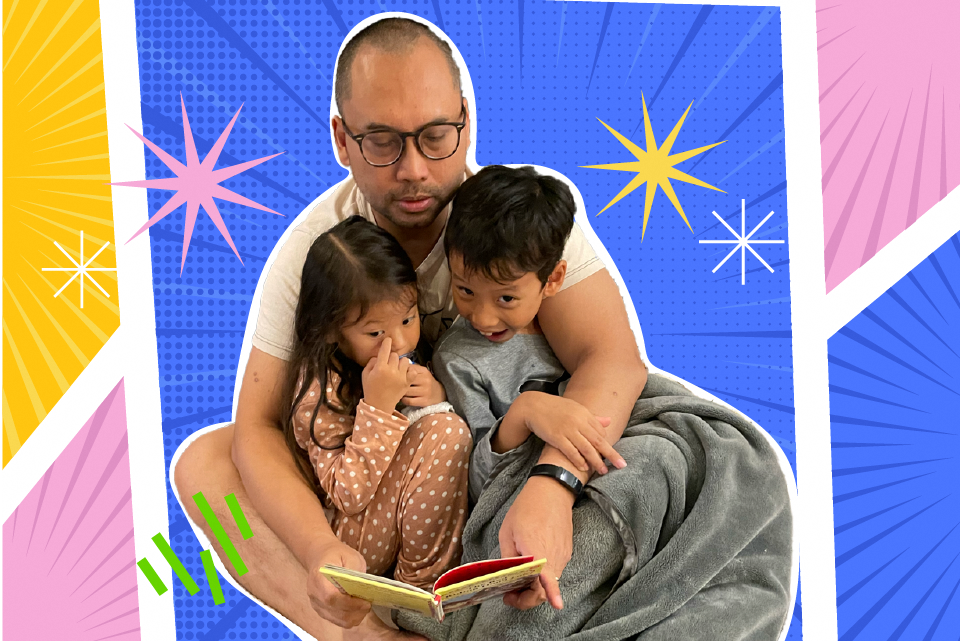How we went from Mandarin meltdowns to taking Higher Mother Tongue
28 Dec 2023
.jpg)
Growing up in an English-speaking household, writer Eveline Gan’s daughter used to panic when spoken to in Mandarin. So when the girl was offered a chance to take Higher Mother Tongue at Primary 3, Mum was sure they had the wrong student. How did that work out, for the girl and for the family?
While I had grown up in a household speaking English, Mandarin and Cantonese, my children – like many of their cousins and friends – converse mainly in English.
This comes as no surprise, given that the number of Singapore residents who speak English predominantly at home has gone up, from around 32 per cent to almost half (48.3 per cent) in 2020, according to Singapore’s 2020 census. This cut across the various racial groups, be we Chinese, Malay or Indian.
Meanwhile, fewer residents now speak their Mother Tongue languages at home. This is something that my household was guilty of, despite my multilingual upbringing. It was simply easier for me to stick to a language that I was more familiar with.
For my children, any exposure to the Chinese language took place only when preschool started. I recall a time when my younger daughter J would get emotional and even burst into tears whenever anyone attempted to speak to her in Mandarin. I had to apologise profusely each time.
The situation was not ideal. But when even the grandparents and extended family prefer to speak to my children in English, it’s hard to blame them for struggling with the Chinese language. To them, it seemed nothing more than just another foreign language made up of complicated-looking characters.
With that, imagine my scepticism when J was selected to be among the pioneer batch of Primary 3 students to take Higher Mother Tongue Language (HMTL) in her school last year.
Starting Higher Mother Tongue at an earlier age
Recent changes to the HMTL curriculum mean that more children get exposure to the subject from an earlier age. While all schools have been offering HMTL at Primary 5, Higher Chinese Language has been increasingly available to Primary 3 students.
Higher Malay Language (HML) and Higher Tamil Language (HTL) are also offered to Primary 3 and Primary 4 students respectively.
“Huh? Are you sure J can cope?” I recalled asking her teacher, wondering if she had mistaken my daughter for another student. The teacher assured me that she was referring to J.
It turned out that the criteria for HMTL selection in her school is not solely based on how she performed on paper. As Primary 1 and 2 students do not have weighted assessments, their learning progress for every subject is assessed holistically over the year.
During her Mother Tongue lessons, J did well for components such as her listening, reading and writing. Her teacher also felt that she could cope with the more advanced subject.
‘I went from concerned to no-harm-trying’
Initially, I had reservations about taking up the offer, despite the potential advantage that my daughter could reap from taking HMTL. For example, under the new PSLE scoring system, students who pass Higher Chinese Language will have an edge when applying for admission to Special Assistance Plan schools.
Practical benefits or not, how would I be able to support my child at the more advanced level, particularly without any tuition classes? Even with the basic curriculum, mastering a second language was already pretty challenging.
Attending a parents’ talk over Zoom, organised by the school’s MT department, eased my worries. For Primary 3 and 4 students, HMTL lessons are conducted outside the usual curriculum time. There is also no added pressure, as Primary 3 and 4 HMTL students do not have to take any examinations for HMTL. As her teacher says, there’s “no harm trying”.
In the end, my husband pointed out that I was overthinking the situation; there was “nothing to lose” by letting our daughter gain more exposure in her second language at an early age. Perhaps, it would imbue in her an appreciation for the Chinese language and its culture – something that we have failed to do at home.
Learning – and struggling – together
I would have loved to end here, and tell you how my daughter – now in Primary 4 – suddenly turned into a whiz who can recite “cheem” Chinese idioms and ace all her spelling tests after a year and a half of HMTL lessons. Unfortunately, the truth is, J is still far from being proficient in the language.
On the bright side, that extra HMTL lesson on Fridays seemed to have benefited her. She now sounds less awkward, has a wider vocabulary and is much more confident in conversing in Mandarin. These days, she even corrects her older sister’s Mandarin.
The journey hasn’t been a walk in the park – and I believe, it will never be. As with any language, there is so much to know and learn. We both still struggle. I use the term “we” because her learning journey is mine too. After all, how can a child be expected to learn a language if the parents aren’t involved?
I scratch my head over the complicated-looking words in her textbook and am frustrated by her complaints over how difficult her tingxie (Chinese spelling) is on a weekly basis.
With no one in my social circle to turn to whenever we are stumped by her homework, language translation apps have become our best friend. In eight out of 10 times, my default reply to J’s query “Mama, what is this word?” would be “Err, let’s ask Google?”.
Rediscovering our own interest in the Chinese language
But there are many fun moments too amid the daily grind. Her Higher Chinese lessons are not all practice and drill. I love that my child is exposed to traditional poetry and popular culture in class, as well as fun activities related to the Chinese language.
For one of her assignments, students were asked to learn a Chinese song of their choice and perform it in class. To support her, my husband and I organised a family karaoke session so that she could practise. We had so much fun belting out Chinese pop songs.
Alongside J’s increased exposure, I rediscovered my interest in a language that I had grown unfamiliar with after decades of disuse. All of the phrases that add colour to the language opened up a new world for us that was at times strange, often challenging, but so interesting.
Several months after she started Higher Chinese lessons, a family friend asked J in Mandarin if she had eaten lunch. In the past, she would have simply nodded wordlessly, stared blankly, or even start tearing up.
That day, without missing a beat, she replied confidently in fluent Mandarin, “Wo yi jing chi fan le” (to mean “I’ve already eaten.”).
It was a simple sentence but it was uttered with such ease. I feel hopeful about her MTL journey – so hopeful, we may be hosting more karaoke sessions soon.





